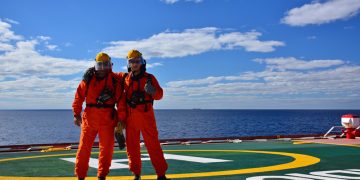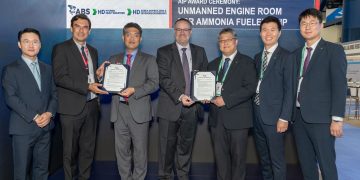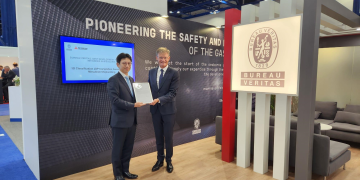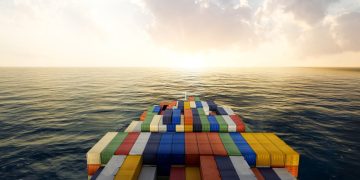The German Bureau of Maritime Casualty Investigation (BSU) published an incident report in which, a fire broke out in the engine compartment on the German fishing vessel FREYJA, which was manned by two fishermen, on the evening of 17 September 2021.
The incident
The fire on board the FREYJA resulted in the destruction of most of the fishing vessel. The fire-induced foundering of the vessel made it impossible to identify usable evidence of the cause of the fire or the exact starting point of its development during the investigation of the wrecked parts. The statements of the crew merely permit the conclusion that the fire broke out inside the engine compartment. Possible causes include battery problems (excessive release of explosive oxyhydrogen gas into the atmosphere of the warm and poorly ventilated engine compartment), contact of lubricant or fuel with hot surfaces, defective insulation of heat-conducting engine components or even a short circuit in the electrical cabling.
In particular, the fact that cabling, conventionally encased in plastic, runs inside the bilge of the fishing vessel with no special additional protection is a risk factor. The insulation of the cables in the bilge is naturally exposed to the chemical influences of the oil and water mixture found there. In this respect, it cannot be ruled out that there has been an undetected degradation of the layers of insulation over the years, subsequently leading to a short circuit that caused the fire. However, it is important to stress that the above considerations are purely hypothetical. The bleak condition of the wreck of the FREYJA did not permit any reliable conclusions as to the actual cause of the fire.
Conclusions
During the investigation into the very serious marine casualty involving the fishing vessel FREYJA, it was not possible to determine the cause of the fire. Nevertheless, important findings were made or those from previous investigations confirmed, which can serve as a basis for safety recommendations.
Fire protection/firefighting – survey procedures of BG Verkehr (DS)
It has once more been confirmed that the outbreak of fire on board a ship represents a particular danger to the life and limb of the crew, to the vessel and to the environment due to the structural characteristics and inherently limited technical and manual options for firefighting. Accordingly, fire prevention measures are extremely important on watercraft.
It is generally known that in addition to the improper execution of welding operations and self-ignition of cargo, technical faults in electrical systems or cabling, battery problems and self-ignition of propellants or lubricants due to contact with hot surfaces are all possible causes of fire on board a ship. In addition to the requisite special care during periodic inspections, maintenance and competent repair of hazardous systems and equipment on board, the survey procedures of BG Verkehr (DS) play a central role, especially with regard to the safety of fishing vessels.
Over the course of their service life, which often spans many decades, some of these vessels have undergone various changes of ownership. Accordingly, but also because of changing regulations and standards, various structural changes and technical modifications are inevitably made on fishing vessels over the years. Past investigations of the BSU have repeatedly confirmed that these have unfortunately not always been carried out with the necessary care and expertise. Moreover, it is not always possible to readily identify any technical deficiencies or their wear-induced development on a ship. This is all the more true because on vessels of the category in question there does not have to be any technically qualified personnel on board who are familiar with the maintenance and care of the machinery apart from the skipper, whose primary concerns are navigating the vessel and fishing.
Safety recommendations
Minimum safe manning document for fishing vessels (formal requirements): The summary table containing the personnel required for shipboard operations in the minimum safe manning document should include specific information on the necessary documents of competency and/or proficiency for each post and reference the relevant regulations.
Minimum safe manning document for fishing vessels (substantive requirements)
When issuing a minimum safe manning document, careful consideration should be given to the fact that the minimum crew complement stipulated and their required qualifications are actually sufficient to ensure, in particular, ship safety and compliance with occupational health and safety regulations for the benefit of everyone on board. Without exception, every crew member should have participated in basic safety training before being deployed on board. In this context, it is also recommended that on covered fishing vessels outside so-called restricted passive coastal fishing, at least one crew member at the support level be required to have professional qualifications as a fish farmer. Should the BG Verkehr (DS) maintain its opinion that the relevant regulations are not sufficient to make the corresponding requirements, then it is suggested that this be reported to the Federal Ministry for Digital and Transport (BMDV) so that the latter can review and if necessary adapt the legal position.
Performing surveys on and issuing safety certificates for coastal fishing vessels of less than 24 metres in length
During the (periodical) surveys of the ship’s safety installations and equipment, surveyors from the BG Verkehr (DS) should pay particular attention to the fire hazard posed by technical installations. The same applies to the existence and proper state of operation and maintenance of portable and permanently installed fire extinguishing equipment. If deficiencies are identified, the safety certificate should initially be issued only on a provisional and temporary basis. The safety certificate should not be allowed to have its full official effect up to the normal expiry date until it is demonstrated (by follow-up survey or the provision of other supporting documents) that all safety-related deficiencies have been rectified within the time limit.




































































